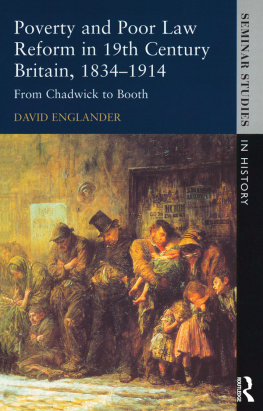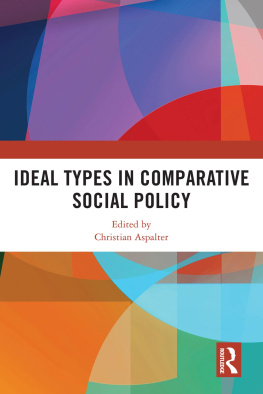ROUTLEDGE LIBRARY EDITIONS:
THE HISTORY OF SOCIAL WELFARE
Volume 1
SOCIAL POLICY 1830-1914
Social Policy 18301914
Individualism, collectivism and the origins of the Welfare State
Edited by
Eric J. Evans
First published in 1978 by Routledge & Kegan Paul Ltd
This edition first published in 2017
by Routledge
2 Park Square, Milton Park, Abingdon, Oxon OX14 4RN
and by Routledge
711 Third Avenue, New York, NY 10017
Routledge is an imprint of the Taylor & Francis Group, an informa business
1978 Eric J. Evans
All rights reserved. No part of this book may be reprinted or reproduced or utilised in any form or by any electronic, mechanical, or other means, now known or hereafter invented, including photocopying and recording, or in any information storage or retrieval system, without permission in writing from the publishers.
Trademark notice : Product or corporate names may be trademarks or registered trademarks, and are used only for identification and explanation without intent to infringe.
British Library Cataloguing in Publication Data
A catalogue record for this book is available from the British Library
ISBN: 978-1-138-20330-3 (Set)
ISBN: 978-1-315-45977-6 (Set) (ebk)
ISBN: 978-1-138-69804-8 (Volume 1) (hbk)
ISBN: 978-1-315-52001-8 (Volume 1) (ebk)
Publishers Note
The publisher has gone to great lengths to ensure the quality of this reprint but points out that some imperfections in the original copies may be apparent.
Disclaimer
The publisher has made every effort to trace copyright holders and would welcome correspondence from those they have been unable to trace.
Social policy 1830-1914 Individualism, collectivism and the origins of the Welfare State
Edited by
Eric J. Evans
Department of History
University of Lancaster
First published in 1978
by Routledge & Kegan Paul Ltd
39 Store Street,
London WC 1E 7DD,
Broadway House
Newtown Road,
Henley-on-Thames,
Oxon RG9 1EN and
9 Park Street,
Boston, Mass. 02108, USA
Set in Bembo by
Computacomp (UK) Ltd
Fort William, Scotland
and printed in Great Britain by
Redwood Burn Ltd, Trowbridge & Esher
Eric J. Evans 1978
No part of this book may be reproduced in
any form without permission from the
publisher, except for the quotation of brief
passages in criticism
British Library Cataloguing in Publication Data
Social Policy, 18301914. (Birth of modern Britain series).
I. Great Britain Social policy History Sources
I. Series. II. Evans, Eric John
300'941 HN385 7730330
ISBN 0 7100 8613 X
0 7100 8626 1 Pbk
The series is concerned to make the central issues and topics of the recent past 'live', in both senses of that word. We hope to appeal to students of history and literature equally, since each has much to offer, and learn from, the other. The volume editors are encouraged to select documents from the widest range of sources, and to convey the 'feel' of particular controversies when passion ran high. One problem for the modern student is hindsight: often, we fall back on over-simplified versions of history Whig or Marxist, progressive or conservative because we fail to imagine events as they were. We hope here to re-create situations through the passions and commitments of participants and contemporary commentators, before the outcome was known. In this way, students are encouraged to avoid both over-simplified judgments and that dull sense that whatever happened was inevitable which can so devitalize our understanding of any period's history, or its art.
We believe that this treatment of the recent past, bringing out of the sense of immediacy and conflict, is also the soundest basis for understanding the modern world. Increasingly, we realize that continuity is more striking than discontinuity: nothing could be more naive than a claim for 'modernity' which assumes that the past is 'irrelevant' or dead. It was during the age of Arnold and Gladstone, Disraeli and Tennyson, Darwin and Chamberlain that our most distinctive modern problems defined themselves the growth of great cities and technology; the battle between individualism and collectivism; the coming of democracy, with all its implications for education, class, vocation and the ordinary expectations of living; the revolutions in travel and communication; the shifting relationships between individuals and the state. Many of the major ideas that shape our world were also born: and in the ferment of day-to-day crises and perplexities, prophetic and widely-ranging hopes and fears, we see the birth of modern Britain, the emergence of our world of today. Volume editors have been encouraged in their selection of material from contemporary sources to illuminate that density and complexity of things which is the essence of 'reality'.
In this volume Dr Evans explores what he rightly describes as the 'prime historical question of the nineteenth century': why the State adopted an increasingly interventionist stance towards society and the economy. Dr Evans's general interpretation of this process has, we believe, two great and very welcome merits. First, while accepting the reality of a 'laissez-faire' ethos influencing public life in the period up to about 1870, he stresses the countervailing existence, not least among the people most conspicuously responsible for that influence, of a most practical awareness of the problems of and the proper limits to the doctrine's application. Second, he resists the temptation to over-estimate the extent to which notions of State intervention had developed before the First World War. The result is a most judicious and finely poised reassessment of perhaps the most important and certainly the most conspicuous aspect of the birth of modern Britain.
For suggestions for further reading, see the introductions to each group of documents.
Contents
The debt which I owe to the many scholars whose specialist studies in nineteenth-century social policy have made this general collection possible will be immediately apparent to every reader. The brief bibliographies at the end of the introduction to each section must serve as inadequate thanks to most of these. In addition, many of the ideas for the organization and arrangement of the book came to me when pondering discussions and tutorials with Lancaster undergraduate and postgraduate students over the past six years. Among many, I must mention Tony Coles who has shared his extensive knowledge of the workings of social policy in Cumberland freely with me. Formal discussion and casual conversation alike with friends in the history department have stimulated my thoughts. In particular, Harold Perkin has offered valuable encouragement and advice throughout; Stephen Constantine, who has shared with me the teaching of the course which acted as a focus for my ideas, often clarified my thoughts or suggested alternative approaches. I am grateful, also, to the University of Lancaster for allowing me two terms' sabbatical leave in 19756, part of which was used to draw together the threads and impose some kind of order on a mass of disparate material.














